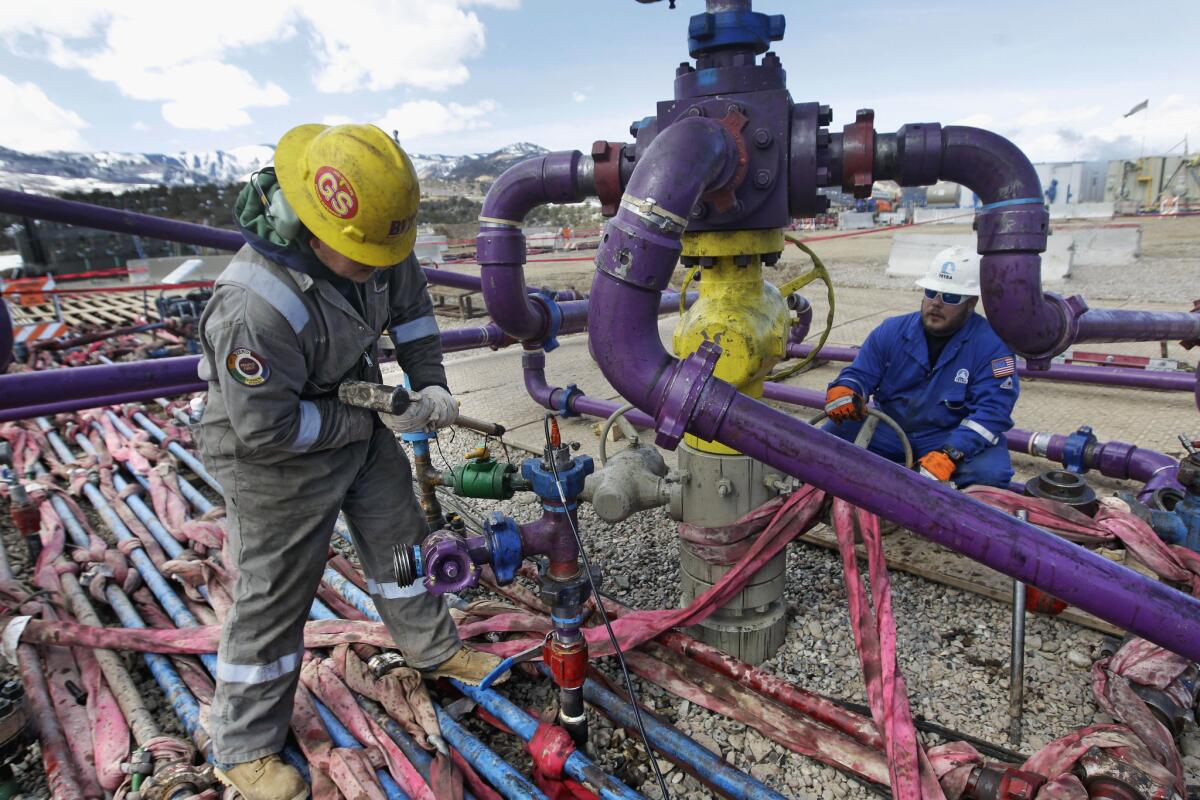Obama administration issues guidelines on using diesel in fracking

WASHINGTON — The Obama administration on Tuesday moved to exert more control over the injection of diesel fuel deep underground to extract oil and natural gas, its first foray into addressing the potential contamination of water from the controversial technique.
The Environmental Protection Agency has little authority to regulate fluids used in hydraulic fracturing, or fracking, which involves pumping water laced with chemicals into shale formations to unlock trapped oil and gas. But the agency has been allowed since 2005 to regulate the use of diesel in fracking. Until Tuesday, it had not done so.
Companies must apply for permits from state or federal authorities to use diesel in fracking. But the EPA had not defined what it considered diesel, which comes in many formulations, complicating efforts to control its use.
The EPA’s new guidance defines five substances as diesel that require a permit for use in fracking.
The agency’s action, however, will have very little overall effect on fracking, since only about 2% of oil and gas operations in the country use diesel. The new measure also leaves many forms of diesel unregulated.
It is not a rule, but guidance on how to interpret the law for federal officials who review and grant fracking permits. Among the recommendations: Officials should get detailed information about a well’s construction and could request additional testing of a well before diesel is used.
Still, environmental groups pushing for tighter oversight of fracking welcomed the initiative.
“We know that diesel fuel is a toxic carcinogen and is a threat to drinking water if used in fracking,” said Environment America’s Clean Water Program Director Courtney Abrams. “The EPA has made a small step toward curbing one of many threats from fracking.”
The American Petroleum Institute, an industry lobbying group, did not respond to a request for comment.
[Updated, 3:38 p.m. Feb. 11: Industry urged the EPA to withdraw the guidance. “This appears to be a solution in search of a problem: Based on actual industry practices, diesel fuel use has already been effectively phased out of hydraulic fracturing operations,” said Lee Fuller, vice president of government relations at the Independent Petroleum Assn. of America. “But by perpetuating this regulatory process, the rule threatens the primacy of states’ underground injection control programs.”]
The 2005 federal Energy Policy Act exempted fracking from several major environmental laws, including the Safe Drinking Water Act, because of what many have called the Halliburton Loophole. Then-Vice President Dick Cheney’s former company, Halliburton, is one of the main oilfield service companies that performs fracking.
The law allowed the EPA to regulate fracking only if diesel was among the compounds used. In the intervening decade, however, the process has grown increasingly widespread and contentious.
Among hundreds of substances used by oil and gas companies during fracking, diesel is used rather than water in geological formations where water might be too readily absorbed.
Diesel contains chemicals that are highly mobile in water, such as benzene, toluene and xylene. Ingested, they pose an increased risk of cancer and damage to the kidneys, liver and nervous system.
The oil and gas industry long denied it used diesel in fracking. But in 2011, a report by House Democrats detailed how 14 oil and gas companies from 2005 to 2009 used 32 million gallons of diesel to fracture shale formations.
Twitter: @neelaeast
More to Read
Sign up for Essential California
The most important California stories and recommendations in your inbox every morning.
You may occasionally receive promotional content from the Los Angeles Times.











